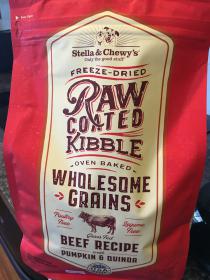I switched both my dogs (Standard Poodles) to grain inclusive about 10 months ago because of what I had researched with the nutritional DCM and because my vet felt there was merit to the issue. My younger dog is eating PPP Sensitive Skin and Stomach (Salmon) and doing well on it and she has a touchy stomach and is hard to switch, I just took my time with her and did it very gradually over 3 weeks or so. My older one is very picky and I tried several brands with her that she turned her nose up at, but she is now happily eating Stella and Chewy’s new wholesome grains raw coated kibble. It comes in beef, which is what she’s eating) and chicken and is legume free. It is also extremely expensive (of course it is since it’s what she decided she will eat LOL) but you can get $5 off coupons here and there so that’s helpful and since I’m only feeding it to her, it’s lasting a while…
[ATTACH=JSON]{“data-align”:“none”,“data-size”:“thumb”,“data-attachmentid”:10519407}[/ATTACH]




